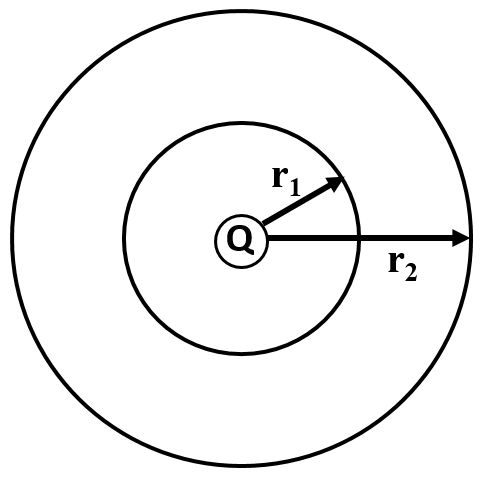All AP Physics C Electricity Resources
Example Questions
Example Question #2 : Electricity And Magnetism Exam
A point charge of 


To find the distance between the two charges, use Coulomb's Law.
Since we want to find distance, 

We know the values of the force and the two charges.
We can plug in these values and solve for the distance.
Example Question #3 : Electricity And Magnetism Exam
What is the electric force between two charges, 


The equation for finding the electric force between two charges is 

Now, we can use the values given in the question to solve for the electric force between the two particles.
Example Question #6 : Electricity And Magnetism Exam
What is the magnitude of the electric field at a field point 

The equation to find the strength of an electric field is 
We can use the given values to solve for the strength of the field at a distance of 
Example Question #1 : Using Coulomb's Law
Two capacitors are in parallel, with capacitance values of 

The equivalent capacitance for capacitors in parallel is the sum of the individual capacitance values.
Using the values given in the question, we can find the equivalent capacitance.
Example Question #2 : Using Coulomb's Law
A proton moves in a straight line for a distance of 

The charge of a proton is 
The force of an electric field is given by the equation 


Example Question #13 : Electricity And Magnetism Exam
Two point charges, 



The values of the charges are:
The distance is 4.0cm. The point 

What is the magnitude and direction of the net electric field at point 
At point 


At point P, the electric field due to Q2 points away from Q2 with a magnitude given by
The addition of these two vectors, both pointing in the same direction, results in a net electric field vector of magnitude 152000 volts per meter, pointing toward 
Example Question #161 : Ap Physics C
A charge, 




Which is the correct relationship between the electric flux passing through the two spherical surfaces around the point charge?
Electric flux is given by either side of the equation of Gauss's Law:
Since the charge is the same for both spherical surfaces, even though these surfaces are of different radii, the amounts of electric flux passing through each surface is the same.
Example Question #1 : Calculating Electric Potential
A proton moves in a straight line for a distance of 

The charge of a proton is 
Potential difference is given by the change in voltage
Work done by an electric field is equal to the product of the electric force and the distance travelled. Electric force is equal to the product of the charge and the electric field strength.
The charges cancel, and we are able to solve for the potential difference.
Example Question #2 : Calculating Electric Potential
For a ring of charge with radius 


Find the expression for electric field produced by the ring.
We know that 
Using the given formula, we can find the electric potential expression for the ring.
Take the derivative and simplify.
Example Question #3 : Calculating Electric Potential
The potential outside of a charged conducting cylinder with radius 

What is the electric field at a point located at a distance 
The radial electric field outside the cylinder can be found using the equation 
Using the formula given in the question, we can expand this equation.
Now, we can take the derivative and simplify.
Certified Tutor
Certified Tutor
All AP Physics C Electricity Resources





















































































